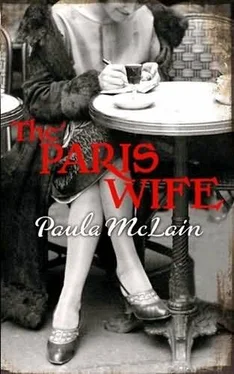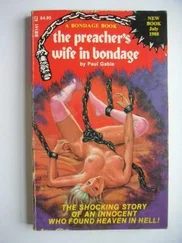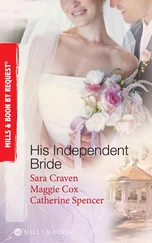“What about Rome?” Ernest asked, filling him in on our longstanding plans to move to Italy.
“Rome certainly has its appeal,” Anderson said, blowing smoke away from his empty plate, “la dolce vita and all that. What’s not to like about Italy? But if you want to do any serious work, Paris is the place to be. That’s where the real writers are now. The rate of exchange is good. There are things to do at any hour. Everything’s interesting and everyone has something to contribute. Paris, Hem. Give it some thought.”
After we climbed into our cold little bed that night, snuggling closer to warm our feet and hands, Ernest asked me what I thought of the idea.
“Can we just switch so quickly? We’ve done so much planning.”
“Rome will be there whenever we want it-but Paris. I want to follow the current. Anderson knows his stuff, and if he says Paris is where we want to be, we should at least seriously consider it.”
We were still so broke the whole thing would have been a moot point, but then I got news that my uncle, Arthur Wyman, had died and left me an inheritance of eight thousand dollars. He’d been ill for some time, but the gift was completely unexpected. That amount of money-a fortune to us-guaranteed our trip abroad overnight. As soon as we heard, Ernest went to see Sherwood in his office downtown and told him we were keen on Paris. Was there anything he could do to pave the way? Where should we go? What neighborhood? What was the right way to go about things?
Anderson answered all of his questions in turn. Montparnasse was the best quarter for artists and writers. Until we found a place, we should stay at the Hôtel Jacob off the rue Bonaparte. It was clean and affordable and there were lots of American intellectuals to be found there and nearby. Finally Anderson sat down at his desk and wrote Ernest letters of introduction to several of the famous expatriates he’d recently met and gotten friendly with, including Gertrude Stein, James Joyce, Ezra Pound, and Sylvia Beach. All were or would soon become giants in the field of arts and letters, but we weren’t aware of this at the time, only that having Anderson’s letter as a calling card was essential. Ernest thanked him for everything he’d done and hurried home to read his words aloud to me in our dim kitchen, each of the letters saying essentially the same thing, that this Ernest Hemingway was an untried but very fine young newspaperman whose “extraordinary talent” would take him well beyond the scope of journalism.
In bed that night as we talked and dreamed about Paris, I whispered into Ernest’s ear, “Are you this fine young writer I’ve been hearing about?”
“God, I hope so.” He squeezed me hard.
On December 8, 1921, when the Leopoldina set sail for Europe, we were on board. Our life together had finally begun. We held on to each other and looked out at the sea. It was impossibly large and full of beauty and danger in equal parts-and we wanted it all.
Our first apartment in Paris was at 74 Cardinal Lemoine, two oddly shaped rooms on the fourth floor of a building next door to a public dance hall, a bal musette , where at any time of day you could buy a ticket to shuffle around the floor as the accordion wheezed a lively tune. Anderson had said Montparnasse, but we couldn’t afford it, or any of the other more fashionable areas. This was old Paris, the Fifth Arrondissement, far away from the good cafés and restaurants and teeming not with tourists but working-class Parisians with their carts and goats and fruit baskets and open begging palms. So many husbands and sons had been lost in the war, these were mostly women and children and old men, and that was as sobering as anything else about the place. The cobblestone street climbed and wound up from the Seine near Pont Sully and ended at the Place de la Contrescarpe, a square that stank of the drunks spilling out of the bistros or sleeping in doorways. You’d see an enormous clump of rags and then the clump would move and you’d realize this was some poor soul sleeping it off. Up and down the narrow streets around the square, the coal peddlers sang and shouldered their filthy sacks of boulets . Ernest loved the place at first sight; I was homesick and disappointed.
The apartment came furnished, with an ugly oak dining set and an enormous false-mahogany bed with gilt trimmings. The mattress was good, as it would be in France, where apparently everyone did everything in bed-eat, work, sleep, make lots of love. That agreed with us, as little else in the apartment did, except maybe the lovely black mantelpiece over the fireplace in the bedroom.
Right away we began to rearrange the furniture, moving the dining table into the bedroom, and a rented upright piano into the dining room. Once we had that done, Ernest sat down at the table and began to write a letter to his family, which was anxious for news of us, while I unpacked our wedding china and the few nice things we’d brought along, like the pretty tea set that had been a gift from Fonnie and Roland, with its pattern of salmon-colored roses and leaf work. Cradling the round teapot in my hands and thinking about where it might belong in my tiny, medieval kitchen, I suddenly had such a pang for home that I began to cry. It wasn’t St. Louis I longed for exactly, but some larger and more vague idea of home-known, loved people and things. I thought of the wide front porch of my family’s house on Cabanné Place, where we lived until just after my father’s suicide: the swing that made a cricket’s noise when I lay in it, my head on a pillow, my eyes fixed on the perfectly straight varnished bead boarding above. Within minutes I was so soggy with longing I had to set down the teapot.
“Is that whimpering from my Feather Kitty?” Ernest said from the bedroom.
“I’m afraid so,” I said. I went to him, wrapping my arms around his neck and pressing my damp face into his collar.
“Poor wet cat,” he said. “I’m feeling it too.”
The table was propped against a narrow window and through it we could see the rough sides of neighboring buildings and shops and little else. In five days it would be Christmas.
“When I was a little girl my mother strung holly boughs along the red glass windows in the parlor. In sunlight or candlelight, everything glowed. That was Christmas.”
“Let’s not talk about it,” he said, and stood to hold me. He guided my head into his chest, to that spot where he knew I felt safest. Through the floorboards and walls, we could hear the accordion from the dance hall and we began to move to it, rocking lightly.
“We’ll settle in,” he said. “You’ll see.”
I nodded against his chest.
“Maybe we should go out now and shop for our Christmas stockings. That’ll cheer up the cat.”
I nodded again and we left for our shopping excursion. At the landing of every floor of the building, there was a basin and a communal toilet, which you used while standing on two pedals. The smells were terrible.
“It’s barbaric,” I said. “There must be a better system.”
“Better than pissing out the window, I suppose,” he said.
Out on the street, we turned left to go down the hill and stopped to peek into the doorway of the dance hall, where two sailors rocked bawdily against a pair of girls, both painfully skinny and heavily rouged. Above the bodies, strings of tin lanterns threw spangled shadows that made the room seem to swim and reel queasily.
“It’s a bit like a carnival in there,” I said.
“I imagine it improves when you’re drunk,” he said, and we quickly agreed everything would be much cheerier if we got drunk ourselves.
We’d yet to fully get our bearings, but we took a winding route in the general direction of the Seine, passing the Sorbonne and the Odéon Théâtre, until we found the Pré aux Clercs, a café on the rue des Saints-Pères that looked welcoming. We went in, taking a table near some British medical students who were talking drily about the effects of alcohol on the liver. Apparently they’d recently been intimate with cadavers.
Читать дальше












